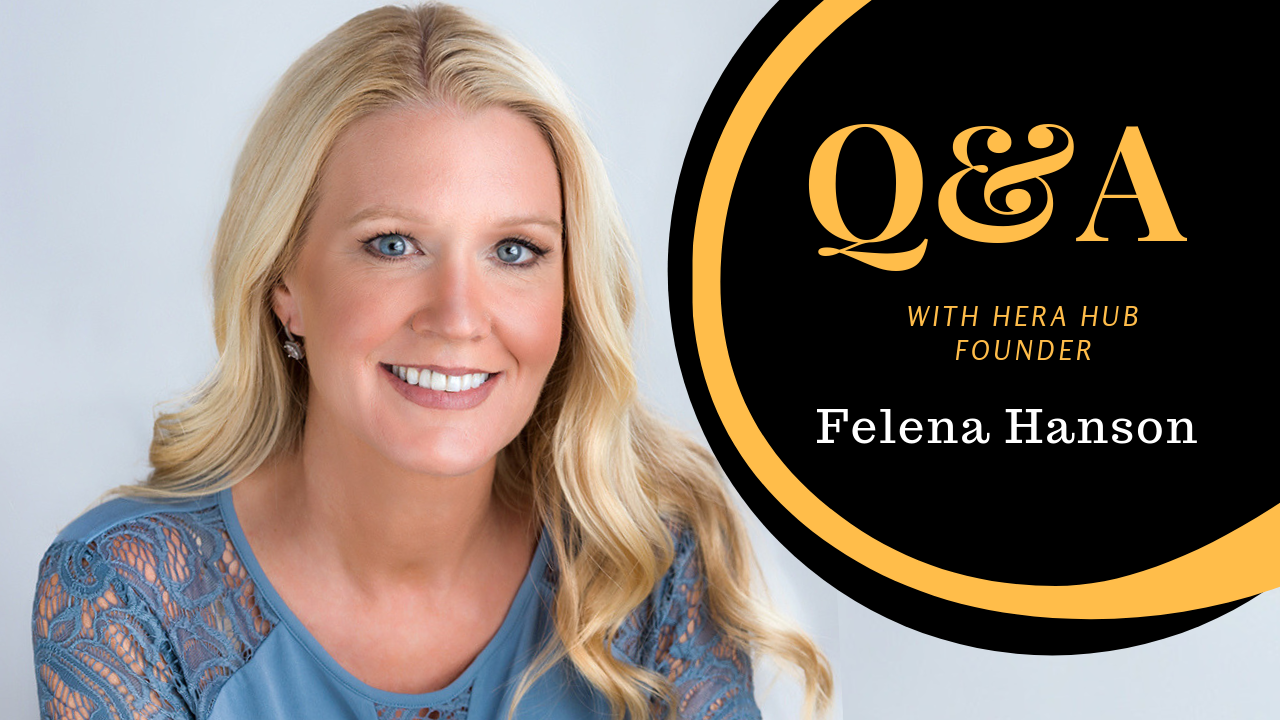- Founded in 2011 by Felena Hanson, Hera Hub has always had a social impact mission and strategy.
- Now Hera Hub has transitioned to a Benefit Corporation, which means it has a stated focus of purpose, accountability and transparency.
- Here, Hanson explains their journey to becoming a Benefit Corporation, how it’s different to a B Corp, and what it means for their future.
In 2011, Felena Hanson launched Hera Hub in San Diego, California. Since then, she’s grown the female-focused coworking space and business accelerator to six (and counting) locations around the U.S., Europe and beyond through a collaborative licensing model.
A longtime entrepreneur, Hanson has focused on social impact since the inception of Hera Hub. Her goal is to help over 20,000 women launch and grow their businesses by the end of 2020.
Hera Hub recently became a Benefit Corporation, which is defined as a “traditional corporation with modified obligations committing it to higher standards of purpose, accountability and transparency.”
Allwork.Space spoke with Hanson about her decision to make social impact a formal part of the Hera Hub model, tracking the social and community impact of the larger coworking movement, and the (somewhat confusing) difference between being a B Corporation and a Benefit Corporation. Here are the highlights of our conversation.
Allwork.Space: You’ve done a lot of work around community and social impact since the inception of Hera Hub. What inspired you to make the company an official Benefit Corporation?
Felena Hanson: I investigated B Corporations well over a year ago. What I realized is that, when you don’t own your own building, there’s a fair bit that’s out of your control. Lighting, water, all these things that would put you in the sustainable category, you don’t have control of. I’d love to put solar on top of the building, but I don’t own it and they won’t let me.
We get asked quite a bit why we aren’t a nonprofit. The gist of it is that there’s a sustainability aspect, and there are populations that need those [nonprofit] dollars. We have nonprofits in our community but, by and large, my members can afford $200 per month to be part of a space. If I’m encouraging people to run a sustainable, profitable business and I’m on the back side asking for handouts, it just doesn’t seem right.
We donate a lot of space to nonprofit organizations. We do a lot to connect with the community and also give back to the community. We run programs and events, we donate a lot of space, we comp workshops, we have an ambassador program to help people get back on their feet after a job transition, there’s a lot that we do.
Every time people ask and I tell people I’m a C Corp, it sounds like I’m the big bad wolf — like I’m McDonalds or something. When we first started out, we were franchising, but ultimately went with a licensing model. Even that word franchising just makes you sound like McDonalds. If you’re not a nonprofit, you’re kind of seen as this evil, greedy, profit-driven company, which is so not true. The margins in coworking are razor thin, if they’re there at all. We’re not doing this to make money.
We started looking at the B Corp thing and realized that it would be tough to qualify for that because so much of what we do, we don’t control the environment as much as we wish we could.
So you went with Benefit Corporation status?
There are B Corps and Benefit Corporations and the difference between the two is confusing. I don’t know why they’d create two designations that are so similar, and make them sound exactly the same. A Benefit Corporation requires you to change your articles of incorporation, change your bylaws, you have to come out with an annual report, and track everything.
Interestingly, it’s more official to be a Benefit Corporation, because of these things you have to do, versus going through and getting the B Corp certification process, which is not a legal entity change. If you are a B Corp, it’s saying you’ve gone through the certification and gotten a score that meets the threshold of sustainability and community benefit.
From a values mindset, why is this all interesting and important to you personally?
Honestly, it’s what we’ve always done. It’s just being able to put a name on it. I’m not a nonprofit, so what other label can I put on it to get people to understand that we’re not a money-greedy corporation?
We’ve always done all of this. We’re not changing one thing that we’ve always done—although in anticipation of this, we started setting up systems to track our work better. We’ve always donated thousands and thousands of dollars worth of space. It was just last year that we started tracking and running a report about nonprofit usage.
People, planet, community, being a platform for so many organizations here in San Diego is something we’ve always done, we’ve just never had a label for it.
It sounds like it’s a given for you to support your local community. Has that awareness and social impact aspect always run through your work?
You don’t start a coworking space unless you want to create a place where everybody can come. It’s just inherent.
I’ve been an entrepreneur since 2003. Throughout that process, I’ve always served on boards of nonprofits, and I’ve always donated a lot of my time. That’s part of the reason I started Hera Hub — I was running around with these groups, trying to find space for an event or a board meeting. It was tough. I thought, I’m already doing all the stuff, let’s just bring everybody here.
By doing this, you plant a flag in the Hera Hub community, your local communities, and in the coworking movement. When it comes to community impact, what would you like to see from the larger coworking community?
I suspect a lot of spaces are doing a lot to support their community, but are we tracking it in a systematic way so we can share it? I don’t want to turn it into an us versus WeWork comment, but that will continue to differentiate locally owned and operated coworking spaces.
That’s why I decided to grow through a licensing model as opposed to a company-owned model because it’s so critically important to have the connection between the owner of the space and the community. I’m a business owner too. I’m not just a random person that got plopped into a community manager position — I’m in it with you. It’s important to continue to tell that story. Measuring, reporting out on it, and making it known what coworking spaces are doing is important.
How would you advise other space operators considering becoming a Benefit Corporation?
First, they need to see if the state they’re incorporated in recognizes Benefit Corporation designation. The last time I looked, 32 states did, so it’s quite a few, but not all. Then engage an attorney that knows about B Corps and Benefit Corporations because you’re amending your bylaws, amending your articles of incorporation, filing with the state, then going through a process where you change your corporate filing. The process could take about three months. It’s not highly arduous, but it is planting a flag in the ground about what is important to you.
Do you get to define the impact you’re having as a Benefit Corporation? Is there leeway to establish the different benefits you provide?
Yes, as long as it comes under the category of public benefit. To confuse it further, sometimes you’ll see it listed as a Benefit Corporation and sometimes you’ll see it listed as a Public Benefit Corporation. You just make the case that you’re not just profit driven — that you’re doing things that would be considered a public benefit.
For us, a lot of that is donation of space, donation of programs, having scholarships on some of our programs for people to go through for free, and showing how that, in turn, benefits the public. Say someone goes through a launch lab for free, then starts a business, you make the argument that it’s a new business started in your city, it’s giving that person work, and they may employ other people.
What’s the response to your Benefit Corporation status been, both in your spaces and communities, and the larger coworking and workspace industry?
The feedback has been really, really good. A lot of people are like, “Oh, cool. What is that?” Which is understandable. But it’s been 100 percent positive.
You’re ahead of the curve, Felena. I think purpose-driven business is the future. I’ve seen studies that younger people want to work for companies — and in workspaces — that care and that have purpose driving the business, and not predatory capitalistic companies.
Oh yeah, one hundred percent. I live in a bubble in San Diego, and you live in a bubble in Santa Cruz. Truly, I assume every company gives back and is purpose-driven.
I went to business school, so I should know better, but in the world I live in, everybody does that. I forget that there are companies that aren’t interested in that. It seems so 1980s to me, but apparently there are still companies that are solely focused on shareholder value and returning money to the shareholders.
It’s refreshing to see people like you who are sustainably, successfully doing good work in the world. That is where it’s at. What’s next for you and Hera Hub?
We’re opening in Atlanta, and two more locations here in Southern California — Irvine and Temecula. I have candidates that have gone through market assessment in Las Vegas, Nevada; Tucson, Arizona; Mobile, Alabama; and we’re exploring opening spaces in Lagos, Nigeria; Karachi, Pakistan; and Hong Kong.

















